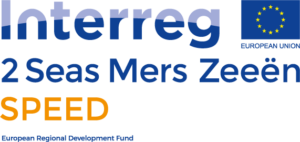The Interreg SPEED project is aimed at bridging the gap between the Data Science & IoT- market and the Western-European port market. The project’s research team is currently working on a diagnostic toolkit for supporting high-tech smart port focused entrepreneurs in their professionalization track.
As the founder and CEO of Dorset Creative, Nathan Revill has led his company passed the startup phase and succeeded in professionalizing his growing business. These and other experiences have provided him with a practical understanding of the hurdles high-tech entrepreneurs have to overcome in order to professionalize their company. Via WSX Enterprise, one of our project partners, we met Nathan to talk about the growth-and professionalization track of Dorset Creative.
Dorset Creative
From website development and video production, Dorset Creative grew into software development, virtual reality and 3D-modelling (among many others). In Bournemouth, UK, the company engages in product and service development for multiple industry types. In order to provide their clients with even better experiences, Dorset Creative collaborates with key partners, such as Microsoft and always pursues technological innovativeness.
Know your company’s life cycle phases
Nathan shared some practical insights related to small tech-based companies in their professionalization phase (or moving toward it). One interesting point discussed concerned the acknowledgment of, and the distinction between specific life-cycle phases of a company, as well as the understanding of which cycle the company is currently in. This knowledge becomes increasingly important the more the company wants to grow.
Match priorities and skills to specific stages of growth
Prior to outgrowing it and moving to a larger office space, Dorset Creative was located in an incubator. One of the reasons entrepreneurs (and their startups) often benefit from being located inside such an entity, is the network they become part of and get access to. At the start, entrepreneurs often find they can relate to other entrepreneurs and learn from each other’s mistakes. Later, however, after the startup phase has passed, decision-making will change, and priorities tend to shift. Companies that appear quite similar at the start, might look completely different at this (later) stage. These particular differences can emerge in very obvious or very subtle ways. Additionally, the nature of advice sought modifies with the company’s needs in each phase. While it should become more apparent what the company needs and what roles will be taken on by whom, it is key for the manager (or the management team) to know what skills are best put to use in which part of the company. This may include the need for specific expert-advice in some or other areas.
Make sure you understand before you make decisions
As a company manager, you’re expected to understand your own limitations and your company’s needs at all times. Although this might seem an obvious task, it might prove to be very challenging at times. Nor a company’s phase, nor its needs are constantly simple and straightforward. They are usually more complex and intertwined. This is where expert advice and related investment decisions are going to play an essential role. A certain understanding in relation to specific company and (management-) team elements can certainly help in reaching out for the right advice, and making better decisions, whether strategic or operational.
We would like to thank Nathan Revill at Dorset Creative for taking the time to converse with us for the benefit of future tech-based companies and research purposes.
For further information on the Interreg SPEED diagnostic and improvement toolkit, please contact Morane Atzmon (morane.atzmon@uantwerpen.be) or Johanna Vanderstraeten (johanna.vanderstraeten@uantwerpen.be).
To find out more about Dorset Creative, their product and their team, please visit their website.
To find out more about WSX Enterprise, please visit our partner page.
This research project was carried out by Johanna Vanderstraeten, Sascha Albers, Rudy Martens and Morane Atzmon.
Johanna Vanderstraeten is assistant professor of (international) entrepreneurship, Sascha Albers is professor of international management, Rudy Martens is full professor of general and strategic management, and Morane Atzmon is Ph.D. candidate at the Faculty of Business and Economics of the University of Antwerp.
This research was supported by WSX Enterprise and benefited from the funding of Interreg 2 Seas.





